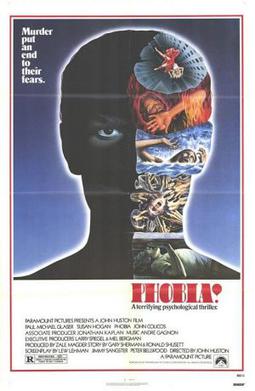Phobia (1980 film)
Phobia is a 1980 Canadian psychological thriller film directed by John Huston. The screenplay, written by Gary Sherman, Ronald Shusett, and Lew Lehman, explores the story of Dr. Peter Ross, a psychiatrist who employs an experimental technique to treat his patients' phobias. The technique involves exposing patients to their deepest fears in a controlled environment. However, the therapy takes a sinister turn when patients start being murdered in ways that eerily resemble their phobias.
Plot[edit | edit source]
Dr. Peter Ross, played by Paul Michael Glaser, is a psychiatrist using radical exposure therapy to cure patients of their crippling phobias. His controversial methods involve placing patients in a machine that induces hallucinations of their greatest fears. Despite his dedication, Ross faces criticism and skepticism from his peers in the medical community. The situation escalates when his patients begin to die in mysterious circumstances, each death reflecting the patient's worst fear. Ross must race against time to uncover the killer before more lives are lost, including his own.
Cast[edit | edit source]
- Paul Michael Glaser as Dr. Peter Ross
- Susan Hogan as Jenny St. Clair
- John Colicos as Barnes
- David Bolt as Henry Owen
- Patricia Collins as Barbara Grey
- Lisa Langlois as Laura Adams
- Alexandra Stewart as Ruthie Miller
- Neil Vipond as Dr. Clegg
Production[edit | edit source]
Directed by the legendary John Huston, Phobia marks a departure from his usual genre, delving into the psychological thriller and horror territory. The film was shot in Toronto, Canada, utilizing the city's urban landscape to enhance the eerie and suspenseful atmosphere. Despite Huston's acclaimed directorial career, Phobia received mixed reviews, with some critics questioning the fit between Huston's style and the horror genre.
Reception[edit | edit source]
Upon its release, Phobia received a lukewarm reception from both critics and audiences. The film's attempt to blend psychological analysis with slasher elements was seen as ambitious but ultimately not fully realized. Critics pointed out the film's pacing and some implausible plot points as weaknesses. However, some performances, particularly that of Paul Michael Glaser, were praised for their intensity and depth.
Legacy[edit | edit source]
While not one of John Huston's most remembered works, Phobia has gained a cult following over the years. Fans of the film appreciate its unique blend of psychological thriller and horror, as well as its attempt to explore the concept of fear in a clinical context. The film is also noted for its early exploration of virtual reality as a therapeutic tool, a concept that has gained more relevance in recent years.
Search WikiMD
Ad.Tired of being Overweight? Try W8MD's physician weight loss program.
Semaglutide (Ozempic / Wegovy and Tirzepatide (Mounjaro / Zepbound) available.
Advertise on WikiMD
|
WikiMD's Wellness Encyclopedia |
| Let Food Be Thy Medicine Medicine Thy Food - Hippocrates |
Translate this page: - East Asian
中文,
日本,
한국어,
South Asian
हिन्दी,
தமிழ்,
తెలుగు,
Urdu,
ಕನ್ನಡ,
Southeast Asian
Indonesian,
Vietnamese,
Thai,
မြန်မာဘာသာ,
বাংলা
European
español,
Deutsch,
français,
Greek,
português do Brasil,
polski,
română,
русский,
Nederlands,
norsk,
svenska,
suomi,
Italian
Middle Eastern & African
عربى,
Turkish,
Persian,
Hebrew,
Afrikaans,
isiZulu,
Kiswahili,
Other
Bulgarian,
Hungarian,
Czech,
Swedish,
മലയാളം,
मराठी,
ਪੰਜਾਬੀ,
ગુજરાતી,
Portuguese,
Ukrainian
Medical Disclaimer: WikiMD is not a substitute for professional medical advice. The information on WikiMD is provided as an information resource only, may be incorrect, outdated or misleading, and is not to be used or relied on for any diagnostic or treatment purposes. Please consult your health care provider before making any healthcare decisions or for guidance about a specific medical condition. WikiMD expressly disclaims responsibility, and shall have no liability, for any damages, loss, injury, or liability whatsoever suffered as a result of your reliance on the information contained in this site. By visiting this site you agree to the foregoing terms and conditions, which may from time to time be changed or supplemented by WikiMD. If you do not agree to the foregoing terms and conditions, you should not enter or use this site. See full disclaimer.
Credits:Most images are courtesy of Wikimedia commons, and templates Wikipedia, licensed under CC BY SA or similar.
Contributors: Prab R. Tumpati, MD

